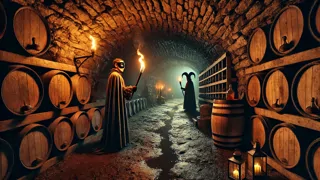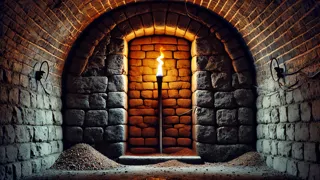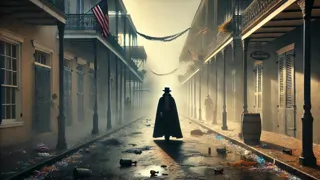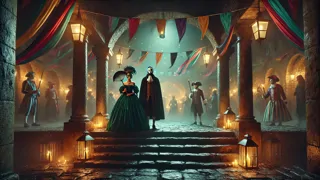Introduction
Under a canopy of lanterns and fluttering streamers, the French Quarter gleamed with a feverish glow. Revelers in sequined masks and velvet cloaks drifted through the labyrinth of narrow streets, their laughter echoing against ancient brick walls. At every corner, the scent of spiced rum mingled with sugar and smoke, painting the midnight air in bold strokes of color and sound. Amid the swirl of music and footfalls, two figures moved apart from the throng—one tall, cloaked in deep emerald, his face hidden behind an expressionless porcelain mask; the other, rubicund and buoyant, wearing a gaudy harlequin’s motley and a grin that dared the night to deepen. Montresor’s heart thudded beneath his battlements of reason, each beat marking a vow whispered in shadow: Fortunato’s arrogance would meet its match. He had plotted for months, selecting the moment when the carnival’s chaos would mask his own hidden designs. He approached his unsuspecting quarry with a goblet raised in innocent measure, the promise of Amontillado drawn from a cask as rare as it was coveted. That single gesture set into motion the final act of a cruel theater. Joy would dissolve into dread, laughter into gasps, and beneath the carnival’s luminous veneer lay a passage deep into betrayal. So begins a winding path of masks and mortar: where every echo in the stone corridors speaks of grudges long buried, and the final curse is sealed in wine and brick.
The Grand Carnival's Lure
The grand procession wound its way through streets alive with painted faces and torchlight. Montresor, blending into the swirl of revelers like a shadow among specters, memorized each footfall of his unsuspecting victim. Fortunato’s laughter rang out like a foreign melody—confident, brash, convinced of his own invincibility. He pranced forward on polished boots that clicked against cobblestones, throat warm from wine and ego. Sensing his moment, Montresor slipped an arm beneath Fortunato’s own, offering a silver flask inscribed with gilded vines. “My dear Fortunato,” he murmured, “we search in vain for Amontillado these days. I’ve found a small cask tucked away behind the cellars of this very palace. An exquisite drop. Surely a connoisseur such as yourself cannot resist?” The carnival swirled past in a riot of color—crimson, violet, emerald—while masked acrobats tumbled overhead. Revelers juggled fire torches, their faces half-buried behind delicate lace masks that accentuated sly eyes. Montresor matched Fortunato’s pace step for step, careful to let his rival believe he’d stumbled upon this treasure by accident. Every phrase dripped with invitation; every gesture was a trap sealed in polite intrigue. As they surged past a triumphal arch of roses and horns, Montresor noted the flicker of doubt in Fortunato’s eyes—doubt quickly drowned by pride. Surely you would never question a friend’s word? A toast! And so, with laughter and self-assurance, Fortunato followed, unaware that each step took him deeper into Montresor’s hidden design.

Descent into the Cellar
They turned away from the festive parade into a narrow alley choked with festooned banners and driftwood barrels. Faint strains of accordion music faded as they passed beneath a low stone lintel, its surface slick with age. Montresor paused, lifted a torch, and watched Fortunato squint against the sudden gloom. “Here,” Montresor called softly, his voice echoing within the stone vault. “The cask lies just beyond.” The damp walls oozed moisture, and the air carried the musk of fermenting grapes and mildew. Each step echoed like a tolling bell, amplifying Fortunato’s own rasping breath. He stumbled over a broken flagstone, and Montresor offered a steadying palm; the contact felt deliberate, possessive. “Strengthen your spirit,” he said, “this Amontillado is worth every hardship.” Fortunato’s grin glimmered in the flicker of torchlight, mask half-revealing the flush of excitement. The corridor deepened into caverns lined with wooden racks. Shadows danced across barrels stacked three tiers high. Montresor paused before a sealed door. With a practiced hand, he slipped a rusted key into the lock. The latch gave way with a hollow click, and behind it lay a narrow niche hewn from living rock. He guided Fortunato inside, then closed the entrance on an unsuspecting laugh. “A toast, my friend,” Montresor whispered as he raised the torch higher. But Fortunato’s reply never came. The walls leaned in, pressing with centuries of secrecy. His fate dangled like a goblet suspended between jest and horror. Beneath the carnival’s laughter, the cellar swallowed their echoes.

The Seal of Vengeance
Montresor’s hand trembled long enough to betray old passions—the bitterness of every insult Montresor believed had scarred his honor. He produced trowel and mortar from a gray cloth, revealing tools as innocuous as they were damning. Fortunato blinked as Montresor leveled the first bricks against the niche’s entrance. A low chuckle escaped Fortunato’s mask—half disbelief, half defiance. “You jest, Montresor,” he croaked. “Seal me behind these stones, and what will the carnival do without my connoisseur’s opinion?” Montresor’s fingers pressed another brick into place. Mortar oozed in alabaster ridges, sealing the cold cavity. The torch wavered, sending his own shadow dancing across the unmoving form. Every brick was a sentence; every layer of mortar, an unspoken oath. Fortunato’s laughter turned to coughing, then silence. Montresor paused to savor the final click of rock meeting rock. Outside, the carnival bells tolled midnight, a mocking chorus to his triumph. He spat curses at an invisible judge: “No one insults Montresor and lives.” He set down his tools, wiped his sweat-streaked brow, and offered a final benediction. The last stone slid seamlessly into place, leaving no trace of life beyond the grave. In the tunnel beyond, footsteps resumed—outsiders searching for lost revelers—while Montresor retreated, mask unchanged, smile hidden. The revelry above roared on without him. Beneath the revel, his vengeance lay entombed in the silent masonry he had forged. The carnival lights flickered. The brick wall held its secret. And Montresor walked on, free at last.

Conclusion
The morning after the carnival’s crescendo, the streets lay littered with torn streamers and scattered confetti. The laughter had waned, leaving whispers of last night’s debaucheries. Montresor slipped through the waning crowds beneath a pale sunrise, mask gone yet his heart still shrouded. No one suspected that the proud Fortunato never returned to the world above—that he stood forever silent behind mortar and stone. In the smoky taverns and along the river’s edge, stories swirled of a hidden cellar and a nobleman’s final verdict. Yet no proof emerged beyond rumors, and the guise of celebration brushed away any disquiet. Years later, long after the casks of Amontillado had turned to dust, even Montresor’s own reflection haunted him in quiet moments. In crowded halls, he glimpsed the empty eyes of a fractured mask, reminding him that vengeance—once tasted—satiates nothing. The carnival’s pageant would return, its colors bright as ever, while deep beneath the arches of memory lay the silent testimony of a promise fulfilled. The revelers who laughed by torchlight never knew the debt they owed to dark justice, and the tale of that fateful night dissolved like a dying echo. Yet every carnival bell still tolls with shadowed meaning, and every whispered boast carries the weight of unseen retribution.


















